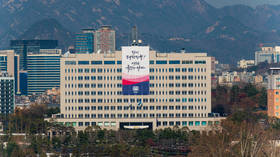The pirates’ Prima Donna

A U.S. businesswoman with links to intelligence and the military has become a modern day Lawrence of Arabia. Conducting talks with the Somali pirates has made Michele Lynn Ballarin an ‘international woman of mystery’.
It has emerged on December 17 that it was, in fact, Michele Lynn Ballarin who was the third party entity conducting talks with the pirates who captured several ships off the coast of Somalia. Amongst them is the Ukrainian vessel Faina, which is carrying a cargo of tanks.
Again, just like in late November, the pirates have halted all talks with official channels of negotiation and proceeded to communicate with Ballarin directly via satellite phone. Previously, this had become an issue of major concern for executive negotiators.
A senior government official had told ABC News: “It's pretty sad when a horse country socialite has more sway in Somalia than the whole U.S. government.”
On the international arena, the Virginian businesswoman claims that her interests lie with the freedom and independence of the Somali people. At least, this is what the official press statements made by Ballarin and her subordinates point to.
When her negotiations with the pirates first began on the 24th of November, she insisted that she was determined not only to free the two ships that she was in communication with, but also to bring piracy around the coasts of Somalia to a halt altogether.
To help encourage Somali residents to patrol their own waters and discourage locals from turning to piracy, Ballarin hatched a plan to recruit 500 men and women to serve as Somali coast guards. They would operate out of the country’s major port of Berbera.
To fund it, she conducted talks with international aid agencies and encouraged members of the various governments running Somalia to tax the country's vibrant currency exchanges and some of its companies. Nevertheless, the plan is complicated by the fact that Berbera itself is actually located in Somaliland, a self-proclaimed break-away entity, renowned for extreme and uncontrolled disorders which have taken many lives.
As reported by the businesswoman herself and her colleagues, her goal is a noble one: to turn Somalia from a failing state into a functioning one, suitable for investment. She has constructed an intricate network of clan and sub-clan leaders in every region of the country over the five years she has been involved in the country. These connections have helped her to exert unprecedented pressure in the region.
The pirate Ballarin-a
Ballarin runs a small Virginia-based company – Select Armor – that designs and makes body armor, and provides executive protection to wealthy individuals. She has a long history of involvement in Somalia, including allegations by a respected publication – “Africa Confidential” – that she was helping plan military operations there in 2006.
Reportedly, Ballarin is known as “Amira” in Somalia, which translates from Arabic as “princess”. And, according to local reports, she is treated like one as well. The captured Faina's captain helped the pirates drop a sign over the ship's side with the word “Amira” written on it. The crew of the Sirius draped a similar sign over the side of their ship. This could potentially suggest that the pirate crews may be seeking help from their benefactor.
There have been several suggestions which attempt to explain the “pirate princess’” interest in the Horn of Africa area. One of them is described as an elaborate attempt to completely subdue the area in order to expand her security business. In a state of inter-governmental havoc, various authorities would seek private assistance, in which Ballarin would be a leading market player.
In 2006, it emerged, via the Observer newspaper and the newsletter Africa Confidential, that a couple of U.S. based private military companies – Select Armor and ATS Tactical – were planning an intervention in Somalia. The reports quoted Ballarin as claiming to have had meetings in Virginia with intelligence agencies. Documents that came to light involved Select Armor trying to persuade the Ugandan government to use their “end user certificates” to circumvent a UN arms embargo on Somalia.
Related Links
Somali pirates just pawns in a global business
Riot on pirates' seized ship?
Somali pirates threaten to cancel ransom deal












